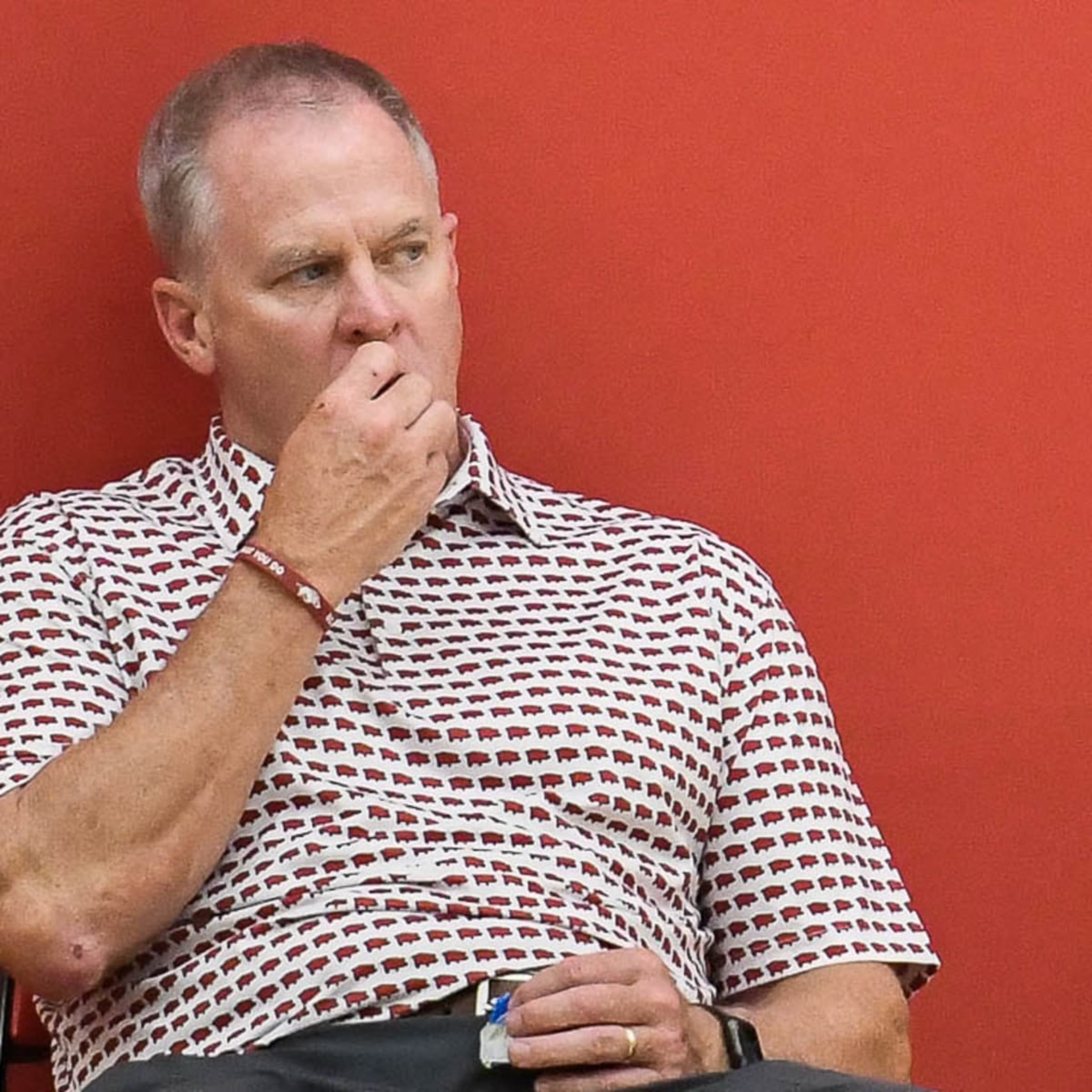
Few college athletic directors are as hot as Arkansas' Hunter Yurachek, who, after a few sport management classes at Guilford, knew what he wanted to do with his life.
"I knew from the start I wanted to run an athletic department in the SEC or ACC and I just made it my goal to get there."
He is the longshot that keeps coming through, the kid who ended up at Guilford only because he wasn’t sure he was cut out for the cadet life at VMI, the basketball sub who wasn’t much of a scorer but was gifted at getting the ball to those who could, the unpaid grunt in the Wake Forest University athletic department now running his own major program.
There are bigger rags-to-riches stories than Hunter Yurachek ‘90, if only because Hunter will tell you he never viewed any low points in his career as rag worthy, but rather opportunities. Ever since those Sport Management classes he took as electives at Guilford, he knew what he wanted to do with his life.
“And I wasn’t going to let anything or anyone keep me from doing it,” says Hunter, one of the nation's fastest-rising athletic directors, his unlikely journey that started at Guilford having now thrust him into the demanding position as vice chancellor and athletic director at the University of Arkansas.
“I knew from the start I wanted to run an athletic department in the SEC or ACC and I just made it my goal to get there.”
These days Hunter is one of the rare athletic directors of a Power Five conference school who is as revered by alumni and fans as the players and coaches he oversees. That’s because, top to bottom, few Power 5 programs are oozing success more than Arkansas.
No, really. Pick a sport — any sport — and chances are Razorback fans are button-bursting proud. Last year the Razorbacks (take a deep breath) earned eight top-10 NCAA finishes and a remarkable 10 Southeastern Conference regular season and tournament championships, including SEC triple crown sweeps in both men’s and women’s cross country & track and field, a second-straight women's soccer regular season crown, the program’s first softball regular season title and a baseball regular season and tournament championship. Arkansas’ 10 championships doubled the next closest SEC program. You can exhale now.
Last year Hunter was named one of four athletic directors of the year for the Football Bowl Subdivision by his peers in the National Association of Collegiate Directors of Athletics.
No wonder when Auburn University was looking for a new athletic director last fall, the first person they turned to was Hunter with an offer reportedly worth $2 million annually.
Arkansas wasn't about to let that happen. The school quickly stepped in, signing Hunter to a new deal that went into effect this year, raising his salary from $1.25 million to $1.5 million.
Found his passion
Hunter, who earned a Business Administration degree at Guilford, got a taste of his future during his last two years at the College. He enrolled in two Sport Management classes taught by Herb Appenzeller, the longtime athletic director who created the school’s Sport Studies program more than 40 years ago.
Those classes inspired Hunter to pursue a master’s in Sports Administration at the University of Richmond, which he earned in 1994.
When it came time to put those degrees to work, Hunter applied for a paid fund-raising internship at Wake Forest. He didn’t get the job, but that didn’t deter him. He asked if there was anywhere else in Wake’s athletic program where he might be needed. He even dangled the words “unpaid internship.”
That did the trick. For the next six months Hunter worked an unpaid marketing internship for the Demon Deacons. “I didn’t mind because it never felt like work,” says Hunter. “I loved what I was doing.”
Eventually, the school found a way to pay him $1,000 a month and Hunter was on his way. What followed was a blur of success wherever he landed: Vanderbilt, Western Carolina, Virginia and Akron.
His first job as an athletic director came in 2009 at Coastal Carolina, where Hunter turned a sleepy program into a regional power on and off the field.
In Hunter’s first year at Coastal Carolina, athletic department revenue was at $560,000 counting ticket sales and sponsorships. Under Hunter, the program’s revenue nearly tripled to $1.4 million. That caught the eye of the University of Houston, which hired him in 2015. When Arkansas came calling two years later, Hunter said yes without ever visiting the campus.
David Yancey ’90 remembers Hunter, his basketball teammate, coming off the bench and always providing a spark.
“He played just so hard, relentless really,” says David, who remains a good friend to Hunter. “When we were down or a little sluggish and all of a sudden Hunter’s in there running around and in his opponent’s face and diving after balls, that sort of thing reminded us that’s what we need to be doing.”
David says some athletes leave that passion on the court after college. With others it follows them for life.
“Hunter’s always been committed to bringing his best and that’s why it’s so great to see the success he’s had,” says David.
Hunter says some people are natural-born leaders. He says he picked up those qualities and others putting in those long anonymous hours in the gym and classrooms at Guilford.
“I don't think that I'm sitting where I am today without Guilford,” says Hunter, who was recruited to Guilford by the late Jack Jensen.
“Coach Jensen gave me more than just an opportunity to play basketball,” Hunter says. “He gave me a chance to be a student-athlete and to be a part of a team and to learn hard work and leadership qualities and organizational skills, time management skills. All those things I use today I learned at Guilford.”

